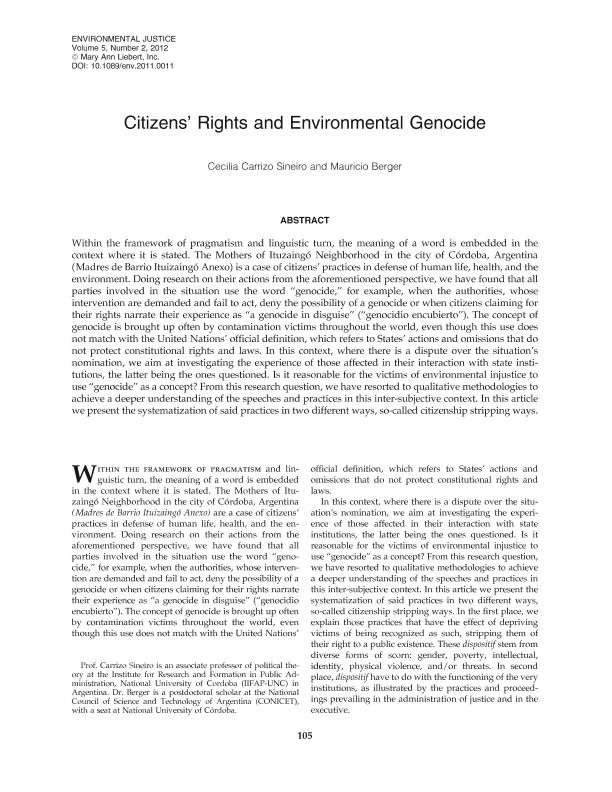Mostrar el registro sencillo del ítem
dc.contributor.author
Carrizo, Cecilia
dc.contributor.author
Berger, Mauricio Sebastian

dc.date.available
2017-04-07T17:46:00Z
dc.date.issued
2012-05
dc.identifier.citation
Carrizo, Cecilia; Berger, Mauricio Sebastian; Citizens Rights and Environmental Genocide; Mary Ann Liebert Inc; Environmental justice; 5; 2; 5-2012; 105-110
dc.identifier.issn
1939-4071
dc.identifier.uri
http://hdl.handle.net/11336/14981
dc.description.abstract
Within the framework of pragmatism and linguistic turn, the meaning of a word is embedded in the context where it is stated. The Mothers of Ituzaingo´ Neighborhood in the city of Córdoba, Argentina (Madres de Barrio Ituizaingo´ Anexo) is a case of citizens’ practices in defense of human life, health, and the environment. Doing research on their actions from the aforementioned perspective, we have found that all parties involved in the situation use the word ‘‘genocide,’’ for example, when the authorities, whose intervention are demanded and fail to act, deny the possibility of a genocide or when citizens claiming for their rights narrate their experience as ‘‘a genocide in disguise’’ (‘‘genocidio encubierto’’). The concept of genocide is brought up often by contamination victims throughout the world, even though this use does not match with the United Nations’ official definition, which refers to States’ actions and omissions that do not protect constitutional rights and laws. In this context, where there is a dispute over the situation’s nomination, we aim at investigating the experience of those affected in their interaction with state institutions, the latter being the ones questioned. Is it reasonable for the victims of environmental injustice to use ‘‘genocide’’ as a concept? From this research question, we have resorted to qualitative methodologies to achieve a deeper understanding of the speeches and practices in this inter-subjective context. In this article we present the systematization of said practices in two different ways, so-called citizenship stripping ways.
dc.format
application/pdf
dc.language.iso
eng
dc.publisher
Mary Ann Liebert Inc

dc.rights
info:eu-repo/semantics/openAccess
dc.rights.uri
https://creativecommons.org/licenses/by-nc-sa/2.5/ar/
dc.subject
Environmental Genocide
dc.subject
Citizenship
dc.subject
Environmental Justice
dc.subject.classification
Tópicos Sociales

dc.subject.classification
Sociología

dc.subject.classification
CIENCIAS SOCIALES

dc.subject.classification
Administración Pública

dc.subject.classification
Ciencia Política

dc.subject.classification
CIENCIAS SOCIALES

dc.title
Citizens Rights and Environmental Genocide
dc.type
info:eu-repo/semantics/article
dc.type
info:ar-repo/semantics/artículo
dc.type
info:eu-repo/semantics/publishedVersion
dc.date.updated
2017-03-27T17:31:42Z
dc.journal.volume
5
dc.journal.number
2
dc.journal.pagination
105-110
dc.journal.pais
Estados Unidos

dc.journal.ciudad
Nueva York
dc.description.fil
Fil: Carrizo, Cecilia. Universidad Nacional de Cordoba. Rectorado. Instituto de Investigación y Formación en Administración Pública; Argentina
dc.description.fil
Fil: Berger, Mauricio Sebastian. Consejo Nacional de Investigaciones Científicas y Técnicas. Centro Científico Tecnológico Córdoba. Centro de Investigaciones y Estudio sobre Cultura y Sociedad; Argentina. Universidad Nacional de Córdoba; Argentina
dc.journal.title
Environmental justice
dc.relation.alternativeid
info:eu-repo/semantics/altIdentifier/url/http://online.liebertpub.com/doi/abs/10.1089/env.2011.0011
dc.relation.alternativeid
info:eu-repo/semantics/altIdentifier/doi/http://dx.doi.org/10.1089/env.2011.0011
Archivos asociados
